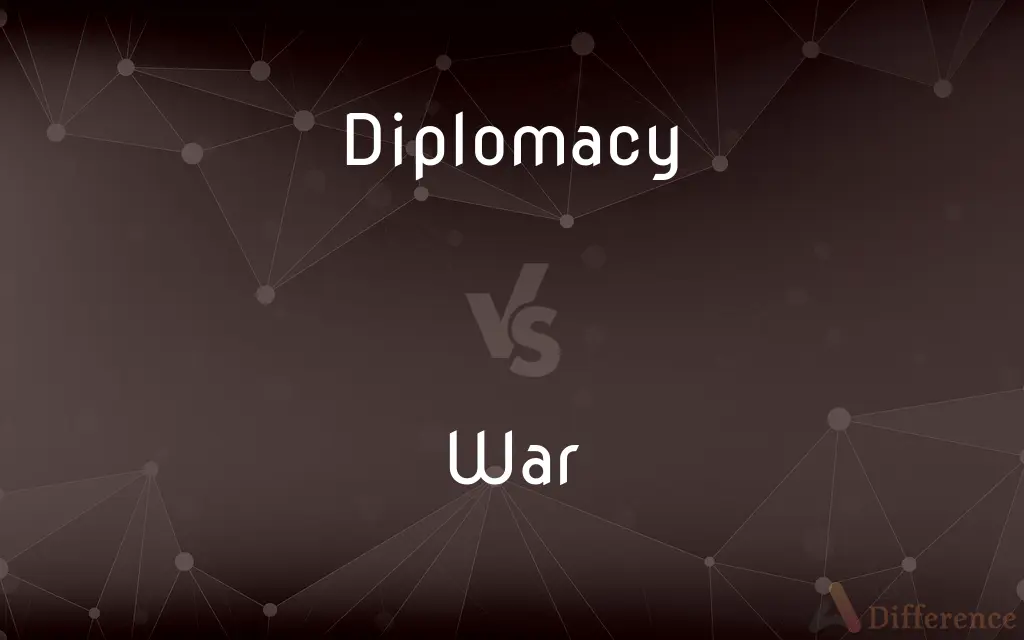Diplomacy vs. War — What's the Difference?
By Tayyaba Rehman — Published on September 25, 2023
Diplomacy refers to the art of managing international relations through negotiation; War is a conflict, typically between nations, involving armed forces and active combat.

Difference Between Diplomacy and War
Table of Contents
ADVERTISEMENT
Key Differences
Diplomacy is the art of managing relations, often international, using dialogue and negotiation. War, on the other hand, represents a breakdown of such dialogue, leading to open conflict.
Through diplomacy, nations aim to prevent, resolve, or manage disputes without resorting to violence. In contrast, war is the escalation of disputes to violent confrontations involving military forces.
While diplomacy employs ambassadors, envoys, and negotiators to bridge divides, war involves armies, navies, and air forces to further national objectives through force.
Diplomacy seeks understanding, cooperation, and mutual benefit, whereas war often arises from unresolved disagreements, competition for resources, or deep-seated historical animosities.
Diplomacy often requires finesse, patience, and mutual respect to foster peaceful coexistence. War, conversely, results in casualties, destruction, and a legacy of trauma.
ADVERTISEMENT
Comparison Chart
Nature
Peaceful negotiations and dialogue.
Violent conflict involving combat.
Goal
Foster understanding, resolve disputes.
Achieve objectives through force.
Participants
Diplomats, envoys, statesmen.
Armies, navies, combatants.
Consequences
Mutual agreements, treaties, alliances.
Casualties, destruction, territorial changes.
Tools & Strategies
Negotiation, mediation, soft power.
Military force, strategy, tactics.
Compare with Definitions
Diplomacy
The skill in managing negotiations and handling people without causing offense.
Her diplomacy at the meeting ensured everyone left satisfied.
War
A state of armed conflict between different nations or states.
The two countries were at war for decades.
Diplomacy
The peaceful management of relationships between nations.
Diplomacy can lead to treaties and improved international cooperation.
War
Any active hostility, conflict, or contest.
A war of words erupted between the two celebrities.
Diplomacy
The subtle skill of tactful dealing in personal matters.
He used diplomacy to reconcile the feuding parties.
War
A prolonged state of competition or conflict.
The two companies were in a price war.
Diplomacy
The art and practice of conducting international relations.
Diplomacy played a crucial role in averting the crisis.
War
A state of open, armed, often prolonged conflict carried on between nations, states, or parties.
Diplomacy
The profession, activity, or skill of managing international relations.
A career in diplomacy often requires postings in various countries.
War
The period of such conflict.
Diplomacy
The art or practice of conducting international relations, as in negotiating alliances, treaties, and agreements.
War
The techniques and procedures of war; military science.
Diplomacy
Tact or skill in dealing with people
Placating the angry customer required delicate diplomacy.
War
A condition of active antagonism or contention
A war of words.
A price war.
Diplomacy
The art and practice of conducting international relations by negotiating alliances, treaties, agreements etc., bilaterally or multilaterally, between states and sometimes international organizations, or even between polities with varying status, such as those of monarchs and their princely vassals.
National diplomacy typically deploys its dexterity to secure advantage for one's nation.
War
A concerted effort or campaign to combat or put an end to something considered injurious
The war against acid rain.
Diplomacy
Tact and subtle skill in dealing with people so as to avoid or settle hostility.
War
To wage or carry on warfare.
Diplomacy
The art and practice of conducting negotiations between nations (particularly in securing treaties), including the methods and forms usually employed.
War
To be in a state of hostility or rivalry; contend.
Diplomacy
Dexterity or skill in securing advantages; tact.
War
(uncountable) Organized, large-scale, armed conflict between countries or between national, ethnic, or other sizeable groups, usually but not always involving active engagement of military forces.
Diplomacy
The body of ministers or envoys resident at a court; the diplomatic body.
War
(countable) A particular conflict of this kind.
Diplomacy
Negotiation between nations
War
Protracted armed conflict against irregular forces, particularly groups considered terrorists.
Diplomacy
Subtly skillful handling of a situation
War
Protracted conflict, particularly
Diplomacy
Wisdom in the management of public affairs
War
Campaigns against various social problems.
War
(business) A protracted instance of fierce competition in trade.
War
(crime) A prolonged conflict between two groups of organized criminals, usually over organizational or territorial control.
War
(Internet) An argument between two or more people with opposing opinions on a topic or issue.
Flame war... edit war...
War
An assembly of weapons; instruments of war.
War
(obsolete) Armed forces.
War
Any of a family of card games where all cards are dealt at the beginning of play and players attempt to capture them all, typically involving no skill and only serving to kill time.
War
(intransitive) To engage in conflict (may be followed by "with" to specify the foe).
War
(transitive) To carry on, as a contest; to wage.
War
Ware; aware.
War
A contest between nations or states, carried on by force, whether for defence, for revenging insults and redressing wrongs, for the extension of commerce, for the acquisition of territory, for obtaining and establishing the superiority and dominion of one over the other, or for any other purpose; armed conflict of sovereign powers; declared and open hostilities.
Men will ever distinguish war from mere bloodshed.
War
A condition of belligerency to be maintained by physical force. In this sense, levying war against the sovereign authority is treason.
War
Instruments of war.
His complement of stores, and total war.
War
Forces; army.
On their embattled ranks the waves return,And overwhelm their war.
War
The profession of arms; the art of war.
Thou art but a youth, and he is a man of war from his youth.
War
A state of opposition or contest; an act of opposition; an inimical contest, act, or action; enmity; hostility.
The words of his mouth were smoother than butter, but war was in his heart.
War
To make war; to invade or attack a state or nation with force of arms; to carry on hostilities; to be in a state by violence.
Rezin the king of Syria, and Pekah the son of Remaliah, king of Israel, went up toward Jerusalem to war against it.
Why should I war without the walls of Troy?
Our countrymen were warring on that day!
War
To contend; to strive violently; to fight.
War
To make war upon; to fight.
To war the Scot, and borders to defend.
War
To carry on, as a contest; to wage.
That thou . . . mightest war a good warfare.
War
The waging of armed conflict against an enemy;
Thousands of people were killed in the war
War
A legal state created by a declaration of war and ended by official declaration during which the international rules of war apply;
War was declared in November but actual fighting did not begin until the following spring
War
An active struggle between competing entities;
A price war
A war of wits
Diplomatic warfare
War
A concerted campaign to end something that is injurious;
The war on poverty
The war against crime
War
Make or wage war
War
A sustained effort to deal with or end a particular undesirable situation or phenomenon.
The government declared a war on drugs.
War
Armed fighting between two or more groups, typically within a country.
The civil war lasted for years, causing much devastation.
Common Curiosities
What's the main aim of diplomacy?
Diplomacy aims to manage international relations and resolve disputes through dialogue and negotiation.
When do countries typically go to war?
Countries go to war due to unresolved disagreements, territorial disputes, resources, or historical animosities.
Can diplomacy prevent wars?
Yes, effective diplomacy can prevent, mitigate, or shorten wars by addressing underlying issues.
What's a diplomat's primary role?
A diplomat's role is to represent, negotiate, and maintain relations on behalf of their home country.
Why is diplomacy important in the modern world?
Diplomacy promotes peaceful coexistence, economic cooperation, and understanding among nations.
What are the consequences of war?
War leads to casualties, destruction, socio-economic disruption, and often long-term political and territorial changes.
Can countries be diplomatic during war?
Yes, diplomacy can continue during war, often seeking peace talks or humanitarian agreements.
What's "soft power" in diplomacy?
Soft power is the influence a country achieves through cultural appeal, values, and non-coercive means, rather than military might.
Are all wars resolved through combat?
No, many wars end through negotiations, peace treaties, or external mediation.
Who participates in diplomatic negotiations?
Diplomats, envoys, statesmen, and sometimes heads of state engage in diplomatic negotiations.
What are some causes of war?
Historical grievances, territorial disputes, ideological differences, and competition for resources can lead to war.
How do international laws influence diplomacy and war?
International laws guide diplomacy through treaties and conventions, and set rules of conduct during wars.
Can diplomacy and war coexist?
While diplomacy seeks to prevent or end wars, they can coexist, with diplomacy continuing even during conflicts.
Are wars only fought between nations?
No, wars can also be internal, like civil wars, or between non-state entities.
What's more costly: diplomacy or war?
While diplomacy has its costs, wars are typically more costly in terms of lives, resources, and socio-economic disruption.
Share Your Discovery

Previous Comparison
Youth vs. Elderly
Next Comparison
Paleo vs. KetoAuthor Spotlight
Written by
Tayyaba RehmanTayyaba Rehman is a distinguished writer, currently serving as a primary contributor to askdifference.com. As a researcher in semantics and etymology, Tayyaba's passion for the complexity of languages and their distinctions has found a perfect home on the platform. Tayyaba delves into the intricacies of language, distinguishing between commonly confused words and phrases, thereby providing clarity for readers worldwide.
















































